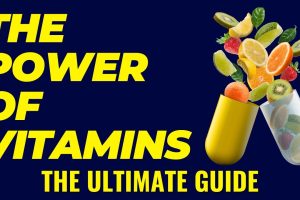Unlocking the Power of Vitamins: A Guide to Healthy Living

Importance of Vitamins in Health
Vitamins play a crucial role in maintaining overall health and well-being. They are essential organic compounds that our bodies require in small amounts to function optimally. Each vitamin has unique benefits—from boosting the immune system to supporting vision and skin health. For instance, when Sarah started incorporating vitamin-rich foods into her diet, she noticed a significant improvement in her energy levels and mood. Key benefits of vitamins include:
- Unlocking the Power of Vitamins: A Guide to Healthy Living
- Importance of Vitamins in Health
- Sources of Vitamins
- Understanding Different Types of Vitamins
- Water-Soluble Vitamins
- Fat-Soluble Vitamins
- Vitamin A: The Vision Vitamin
- Benefits of Vitamin A
- Food Sources of Vitamin A
- Vitamin C: The Immunity Booster
- Role of Vitamin C in the Body
- Natural Sources of Vitamin C
- Vitamin D: The Sunshine Vitamin
- Health Benefits of Vitamin D
- Ways to Get Sufficient Vitamin D
- Exploring B Vitamins Complex
- Importance of B Vitamins
- Foods Rich in B Vitamins
- Vitamin E: The Powerful Antioxidant
- Benefits of Vitamin E
- Sources of Vitamin E
- The Role of Minerals in Vitamin Absorption
- Key Minerals for Vitamin Absorption
- Tips to Improve Mineral Intake
- Supplementing Wisely: Do's and Don'ts
- Considerations Before Taking Vitamin Supplements
- Potential Risks of Overconsumption
- Conclusion: Enhancing Health Through Vitamins
- Key Takeaways
- Immune Support: Vitamins like C and D enhance the immune system.
- Vision Protection: Vitamin A is vital for good eyesight.
- Antioxidant Properties: Vitamins E and C protect the body from oxidative stress.
Sources of Vitamins
Vitamins can be found in various foods, making it easy to include them in daily meals. Here are some common sources:
- Fruits: Citrus fruits (rich in Vitamin C), bananas (Vitamin B6)
- Vegetables: Carrots (Vitamin A), leafy greens (Vitamin K)
- Proteins: Eggs (Vitamin D), lean meats (B Vitamins)
- Nuts and Seeds: Almonds (Vitamin E)
By diversifying your diet, you can ensure an abundant intake of essential vitamins that support a healthier life.
Understanding Different Types of Vitamins
Water-Soluble Vitamins
When diving into the world of vitamins, it’s essential to understand that they come in two main categories: water-soluble and fat-soluble. Water-soluble vitamins, such as B vitamins and vitamin C, dissolve quickly in water and are carried through the bloodstream. Since they aren’t stored in the body, it’s important to consume them regularly. For example, when Mark started drinking more orange juice, he felt his energy levels surge. Key water-soluble vitamins include:
- Vitamin B1 (Thiamine)
- Vitamin B2 (Riboflavin)
- Vitamin B3 (Niacin)
- Vitamin C (Ascorbic Acid)
Fat-Soluble Vitamins
On the other hand, fat-soluble vitamins—like A, D, E, and K—require dietary fat for absorption and can be stored in body tissues. This means you don’t need to consume them every day. Here’s a quick overview:
- Vitamin A: Supports vision and immune function.
- Vitamin D: Aids in calcium absorption.
- Vitamin E: Acts as a powerful antioxidant.
- Vitamin K: Essential for blood clotting.
Including a mix of both types in your diet ensures your body gets the nutrients it needs to thrive!
Vitamin A: The Vision Vitamin
Benefits of Vitamin A
Vitamin A, often dubbed the “vision vitamin,” goes far beyond its reputation for supporting eye health. This powerhouse nutrient is instrumental in maintaining healthy skin, boosting the immune system, and even aiding reproduction. For instance, when Lily committed to increasing her Vitamin A intake, she found that her skin appeared more radiant and her eyes less strained after long days at the computer. Here are some key benefits of Vitamin A:
- Vision Health: Essential for maintaining good eyesight, especially in low-light conditions.
- Immune Support: Strengthens the immune system to fight off infections.
- Cell Growth: Promotes healthy cell turnover and skin health.
Food Sources of Vitamin A
Incorporating Vitamin A into your diet can be both simple and delicious. You can find it in two forms: preformed Vitamin A (found in animal products) and provitamin A carotenoids (found in plant foods). Here are some tasty sources of Vitamin A:
- Animal Sources: Liver, fish, eggs, dairy products
- Plant Sources: Carrots, sweet potatoes, spinach, kale, apricots
By enjoying a variety of these foods, you can easily support your visual health and overall well-being!
Vitamin C: The Immunity Booster
Role of Vitamin C in the Body
Vitamin C is often recognized as the go-to nutrient for boosting immunity, and for good reason! This water-soluble vitamin plays a vital role in several bodily functions, including collagen synthesis, helping wounds heal, and providing powerful antioxidant protection against free radical damage. When Jake started upping his Vitamin C intake during cold season, he noticed fewer sick days and a quicker recovery time when he did catch a bug. Here are some of the primary roles of Vitamin C in the body:
- Enhances Immune Function: Stimulates the production of white blood cells.
- Aids Wound Healing: Crucial for collagen production and tissue repair.
- Antioxidant Action: Neutralizes harmful free radicals to reduce inflammation.
Natural Sources of Vitamin C
Incorporating foods high in Vitamin C into your diet is both enjoyable and easy! Some of the best natural sources include:
- Citrus Fruits: Oranges, grapefruits, lemons, limes
- Berries: Strawberries, blueberries, raspberries
- Vegetables: Bell peppers, broccoli, spinach, kale
- Others: Kiwi, papaya, guava
With such a variety of options available, you can easily enhance your immune system and overall health while savoring delicious and nutritious foods!
Vitamin D: The Sunshine Vitamin
Health Benefits of Vitamin D
Vitamin D, often referred to as the “sunshine vitamin,” is not just essential for maintaining strong bones; it offers a multitude of health benefits that many may overlook. When Lisa began spending more time outdoors and soaking in the sun, she noticed not only a boost in her mood but also an increase in her overall vitality. Here are some health benefits of Vitamin D:
- Bone Health: Aids in calcium absorption, contributing to strong bones and preventing osteoporosis.
- Immune Support: Plays a key role in enhancing the pathogen-fighting effects of monocytes and macrophages.
- Mood Regulation: Linked to improved mood and mental health, potentially reducing the risk of depression.
Ways to Get Sufficient Vitamin D
Getting enough Vitamin D can be achieved through various methods, ensuring your body benefits from its numerous advantages. Here are some effective sources:
- Sun Exposure: Aim for 10-30 minutes of sunlight several times a week, depending on your skin type and location.
- Dietary Sources: Incorporate fatty fish (salmon, mackerel), fortified foods (milk, cereals), and egg yolks into your meals.
- Supplements: If sunlight exposure is limited, consider Vitamin D supplements after consulting with a healthcare professional.
By blending sun exposure, diet, and possibly supplements, you can easily maintain optimal Vitamin D levels and enjoy the health benefits that come with it!
Exploring B Vitamins Complex
Importance of B Vitamins
B Vitamins are essential nutrients that play versatile roles in maintaining our body’s health and function. They are integral to energy production, supporting metabolism, and promoting healthy skin and hair. When Tom noticed fatigue creeping into his daily routine, he decided to increase his intake of B vitamins—almost instantly, he felt more energetic and focused. The B group comprises several different vitamins, each offering unique benefits:
- Vitamin B1 (Thiamine): Supports energy metabolism and nerve function.
- Vitamin B2 (Riboflavin): Helps in red blood cell production and energy release.
- Vitamin B3 (Niacin): Aids in cholesterol management and boosts brain health.
- Vitamin B6 (Pyridoxine): Vital for protein metabolism and brain function.
- Vitamin B12 (Cobalamin): Essential for nerve health and DNA synthesis.
Foods Rich in B Vitamins
Incorporating B vitamins into your diet is both enjoyable and practical. Here’s a list of foods high in B vitamins:
- Whole grains: Brown rice, barley, oats
- Protein sources: Eggs, poultry, fish, lean meats
- Fruits and vegetables: Bananas, green leafy vegetables, avocados
- Dairy products: Milk, yogurt, cheese
- Legumes: Lentils, chickpeas, black beans
By filling your plate with these nutritious foods, you can easily harness the wonderful benefits of B vitamins and energize your life!
Vitamin E: The Powerful Antioxidant
Benefits of Vitamin E
Vitamin E is celebrated not only for its status as a powerful antioxidant but also for a myriad of health benefits that contribute to overall wellness. When Rachel started including more Vitamin E in her diet, she noticed her skin felt smoother and appeared more youthful. This fat-soluble vitamin does wonders for the body—protecting cells from oxidative stress and inflammation. Here are some key benefits of Vitamin E:
- Antioxidant Protection: Shields cells from damage caused by free radicals.
- Skin Health: Supports skin repair and may enhance moisture retention.
- Heart Health: Helps prevent plaque buildup in arteries and supports cardiovascular function.
Sources of Vitamin E
Incorporating Vitamin E-rich foods into your meals can be delightful and easy. Here are excellent sources:
- Nuts: Almonds, hazelnuts, and peanuts
- Seeds: Sunflower seeds
- Vegetable Oils: Sunflower oil, wheat germ oil
- Leafy Greens: Spinach, Swiss chard
- Fruits: Kiwi, avocados
By adding these nutrient-dense foods to your diet, you can enjoy the powerful benefits of Vitamin E while treating your taste buds!
The Role of Minerals in Vitamin Absorption
Key Minerals for Vitamin Absorption
While vitamins are essential for health, minerals play a crucial supporting role in ensuring that those vitamins are effectively absorbed by the body. For instance, when Mia learned about the importance of minerals, she started pairing her meals with mineral-rich foods, noticing a significant boost in her overall vitality. Here are some key minerals that enhance vitamin absorption:
- Magnesium: Assists in converting vitamin D into its active form.
- Zinc: Enhances the absorption of vitamins A and C.
- Calcium: Works closely with vitamins D and K to support bone health.
Tips to Improve Mineral Intake
To optimize your mineral intake, consider these simple tips:
- Diversify Your Diet: Incorporate a variety of foods, including whole grains, nuts, seeds, dairy, and leafy greens.
- Choose Whole Foods: Opt for minimally processed foods that retain their natural mineral content.
- Combine Foods Wisely: Pair calcium-rich foods with vitamin D sources and zinc-rich foods with vitamin A sources for better absorption.
By focusing on these strategies, you can enhance your mineral intake, boosting the effectiveness of the vitamins your body relies on for optimal health!
Supplementing Wisely: Do’s and Don’ts
Considerations Before Taking Vitamin Supplements
While vitamins are essential for health, it’s important to supplement wisely, as more isn’t always better. Before diving into the world of vitamin supplements, consider your specific needs. For instance, when Alex decided to take Vitamin D supplements, he first consulted with his doctor to assess his levels and understand the right dosage for his lifestyle. Here are some key considerations to keep in mind:
- Evaluate Your Diet: Assess whether you’re already getting sufficient vitamins through food.
- Consult a Healthcare Professional: Discuss your health status and any medications you’re taking to avoid interactions.
- Identify Your Specific Needs: Depending on lifestyle factors like age, diet, and sun exposure, your vitamin needs may vary.
Potential Risks of Overconsumption
Taking too many vitamin supplements can lead to unwanted side effects. For example, excessive Vitamin A can cause toxicity and affect liver function. Here are potential risks to be aware of:
- Fat-Soluble Vitamins: Since these can accumulate in the body, overconsumption is particularly risky (e.g., Vitamins A, D, E, and K).
- Nausea and Digestive Issues: High doses of certain vitamins can lead to gastrointestinal discomfort.
- Interference with Medications: Supplements can sometimes alter how medications work.
By being mindful of these factors, you can navigate the world of vitamin supplementation safely and effectively, ensuring that you support your health without unnecessary risks!
Conclusion: Enhancing Health Through Vitamins
In our journey through the world of vitamins, it’s clear that these essential nutrients play a fundamental role in promoting overall health and well-being. Just like when Tom discovered the benefits of incorporating a variety of vitamins into his daily meals, most people can experience a significant boost in health by taking a holistic approach to nutrition.
Key Takeaways
To enhance your health through vitamins, consider the following points:
- Diverse Diet: Aim for a balanced diet rich in fruits, vegetables, whole grains, and proteins to naturally obtain necessary vitamins and minerals.
- Supplement Wisely: If considering supplements, consult with a healthcare professional to ensure you’re meeting your specific needs without the risk of overconsumption.
- Stay Informed: Understanding the role of various vitamins and how they interact with minerals can empower you to make better dietary choices.
By prioritizing these strategies, you can effectively enhance your health and enjoy a vibrant, healthier life all while feeling your best day in and day out!





